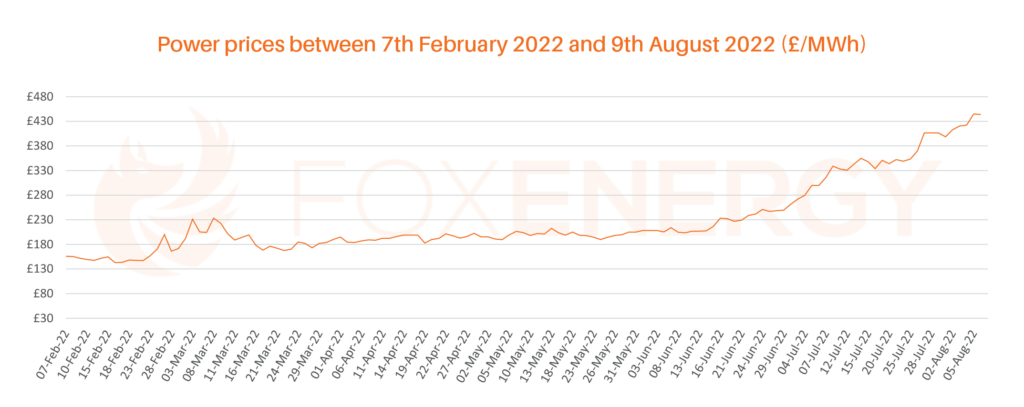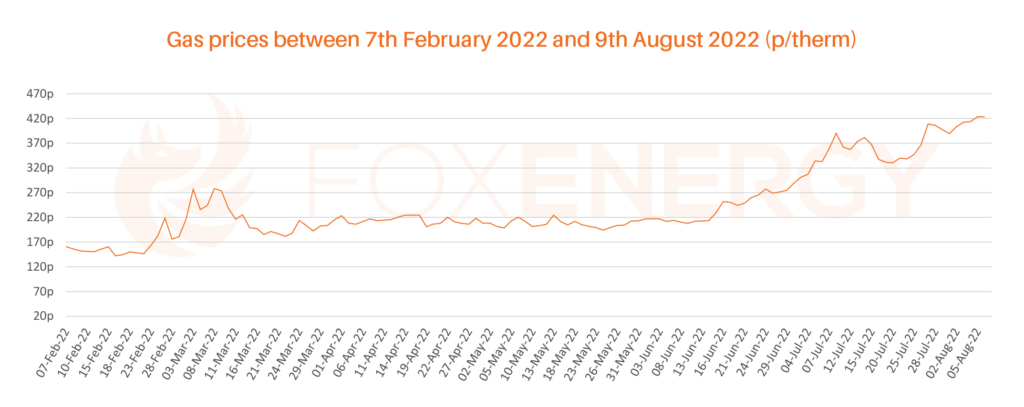
12 August 2022
The last few weeks have bought the catastrophic price increases we feared and had been warning businesses to prepare for, with market analysts predicting likely increases of a further 30% to December 2022. To put that in perspective, at the time of writing we are seeing live market prices of circa 66p pkWh for electric and 18p pkWh for gas and if the market follows the trend expected, businesses not in fully fixed term contracts or coming to the end of an existing contract face astronomical prices of circa 80p pkWh for electric and 24p pkWh for gas over the coming months.
The energy markets continue to remain highly volatile, even as Nord Stream 1 came back into operation following scheduled maintenance works, there was another drop in Russian gas flows (to just 20% capacity) due to continued disagreements regarding paperwork for pipeline parts and turbines, adding to wider supply issues and concerns about gas and power prices for the coming winter. Given the unprecedented price levels, it’s no surprise that businesses are concerned about energy prices and if there is enough supply to meet demand. The continued heat wave and even a drought being announced in parts of the UK is doing little to weaken prices as demand for energy intensive air conditioning and cooling outweighs the power generated by the UK’s solar and wind generation.
Numerous suppliers have announced their intentions not to take on any new business clients and only offer limited renewal contracts to existing customers with good credit and in favorable sectors. Both British Gas and Scottish Power have decided to pull out of the industrial and commercial marketplace altogether, honoring existing contracts to their end, but then will not be offering renewal terms, advising businesses to seek alternate supply. Total Energies and Corona and only offering terms on contracts beginning from the 1st of June 2023, and Drax and EDF are tending to only offer 1-year contracts. With so many suppliers withdrawing from the marketplace, albeit hopefully on a temporary basis, the remaining suppliers such as Scottish & Southern (SSE), Smartest Energy and Pozitive Energy are seeing enormous volumes of desperate businesses look to secure terms, which is causing large delays in contract offers being generated and secured, and in nearly 20 years in the industry I have never seen anything like this!
With live market pricing at such a level, businesses are committing to longer term contracts which are offering a lower overall kWh rate (as suppliers have longer periods to hedge prices over), to limit the increases to their business. This in my opinion is a sensible option, however there will undoubtedly be a point during that 3- or 4-year term where the market price will be lower than the agreed contracted rate – but this period where costs are higher will be hugely offset by the amount saved over the prior periods where the market exceeds that agreed.
With both the Government and energy suppliers both currently reluctant and maybe unable to assist even the domestic market, the future of the business market looks bleak for the foreseeable future.
In other industry news this month:
EU ban on Russian coal comes into force – The European ban on Russian coal has come into effect forecasting yearly losses of €8 billion to the Russian economy. Under the ban all European countries are forbidden to import Russian coal as part of the package of sanctions imposed on Russia. This is around ¼ of all Russian coal exports and joins other banned Russian exports such as crude oil and certain petroleum products.
Government’s energy crisis meeting resolves little – An emergency meeting was held between the Prime Minister, high-profile ministers and energy companies, Prime Minister Boris Johnson, Business Secretary Kwasi Kwarteng and Chancellor Nadhim Zahawi to discuss potential measures to mitigate the rising cost of living. After the meeting, Mr Johnson said: “I know people are worried about the difficult winter ahead, which is why we are providing support – including a £400 energy bill discount for all households. This morning, I urged electricity companies to continue working on ways to help with the cost of living”. Former Prime Minister Gordon Brown has also gone on record stating:” Energy companies that cannot offer to their customers lower bills should be temporarily brought into public ownership” but in response to Mr Brown’s views, a government spokesperson stated that: “A nationalised energy company would still have to buy the same expensive gas on global markets, so prices won’t be lowered in any case”. There had been hopes that with Britons facing unprecedented energy bill increases in October and January, that a deal could be struck that would see energy suppliers doing their bit to support both business and domestic customers. The consensus is that Kwasi Kwarteng is reluctant to enforce a stealth tax on the energy suppliers for fear that they would then be reluctant to ‘help’ in the future when the markets are expected to increase further, pushing many businesses to the brink of viability.
Ofgem says don’t cancel direct debits – but has no good alternatives – With the ‘Don’t Pay UK’ campaign gathering momentum via social media, trying to force energy companies to lower prices (which would never happen), Ofgem has broken silence stating that you should never cancel your direct debit with your energy supplier and Ofgem CEO Jonathan Brearley says cancelling your DD will simply drive-up costs for everybody.
Should you wish to cancel your direct debit, you should consider the following: Your bills will increase if you do not pay via direct debit, you are likely to incur a fee from you supplier and generally direct debit tariffs are far cheaper than prepayment tariffs, thus you will increase the amount you must pay unnecessarily. Your credit score is likely to be harmed as all energy firms report to the Credit Reference Agencies such as Experian, Equifax and TransUnion which will adversely affect your ability to obtain credit in the future. I have seen suggestions on social media that your credit record won’t be damaged if you make a complaint at the same time as cancelling your direct debit. A complaint can go first to your supplier and then be referred or passed onto to the Energy Ombudsman. It is correct that an energy supplier should not harm your credit record if there is a potentially valid dispute about a bill, but I don’t think saying you cannot afford the ongoing bills as the prices are too high would be seen as a valid reason to complain! Your energy supplier may want to fit a prepayment meter if you are in arrears. When you miss a payment, your energy supplier will want you to make an arrangement to pay your ongoing bills plus some extra towards the arrears. The supplier should consider your financial circumstances in setting the arrears payments, but the problem for millions from October will be that they cannot afford the ongoing bills, let alone any extra towards the arrears. Suppliers can get a Warrant from a Magistrates Court to enable them to enter your home and fit a prepayment meter and if you have a new generation smart meter, it is possible that it could be switched to being a prepayment meter electronically. Paying for your energy by prepayment meter is more difficult and more expensive than direct debit and you may be forced to restrict your energy usage a lot and even ‘self-disconnect’ for periods. There is NO chance of being sent to prison as not paying an energy bill is not a criminal offence however meter tampering, to by-pass a meter or make it run slower, is a criminal offence and you can go to prison for these offenses. It can also be dangerous and result in fires – no matter how bad your situation, don’t even think about it, I have seen this happen on numerous occasions over the past few years. Another thing to ignore is any adverts for devices you can plug in that claim to reduce your energy consumption. They don’t work. Don’t waste your money on scams.


For help and advice and to find out how Fox Energy can support and assist your business in these turbulent times, get in touch by calling 01233 884510 or email info@foxenergy.co.uk.





